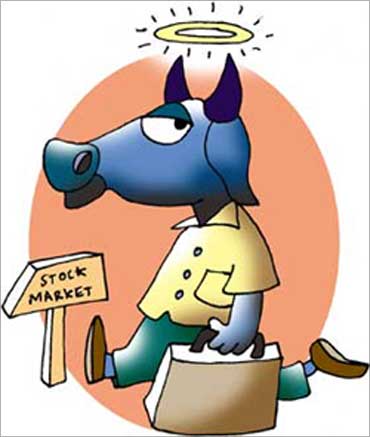 | « Back to article | Print this article |

What are the mistakes a beginner tends to make when investing in equity?
The answer to this query has been written by Samuel Lee, a strategist on Morningstar's passive funds research team based in Chicago. It has been edited to make it applicable to an Indian audience.
Being competent requires avoiding major mistakes. Yet I see time and again investors making basic errors while spending a lot of time and effort trying to beat the market.
The first mistake is failing to understand and manage one's limitations.
It's understood that for every trade there is a winner and a loser. Some mistake this to mean that beating the market is simply a matter of being in the top half of investors -- not a high hurdle.
Slightly more knowledgeable investors realise that transaction costs are involved, so they move the hurdle up to top third or top quartile. What many investors fail to realise is that skilled investors control a disproportionate share of capital. Because each rupee of outperformance must be offset by a rupee of underperformance, each skilled investor must be offset by many unskilled investors.
Put another way, for every Warren Buffett, there are the many losers who stood on the other side of his trades, selling him things he bought, buying the things he sold.
This should scare any beginner. The hurdle is high. Even though I live and breathe investments, I worry about my own ignorance all the time. I know for a fact I have lots of wrong beliefs rattling in my head. The best I can do is to be conscious of this fact and try to root them out. The things I'm very confident in are precious few, and much of it composed of the knowledge of what I know I'm not good at. (If you can't identify many things you're bad at, you're probably overconfident).
Of course, most investors try to hire someone who does know what they're doing -- in other words, give their money to equity and debt fund managers.
Not getting the allocation right.
Even if they do that, investors must realise that the most important decision is really the allocation between stocks and bonds, and how that allocation evolves over time. That's a lever most investors keep firmly in their grasp.
Most investors make a hash of it, so much so that the standard financial advice is to keep one's stock/bond allocation static. It's good advice, to be discarded only after you become justifiably confident in your process. Even then, you might still be wrong. The way to render mistakes as harmless as possible is to keep fees as low as possible and portfolios diversified.
Another mistake is failing to understand the basics.
Let's take the example of an iron ore company. The company, with an iron-ore price of $84 per tonne, would make no money and be of little economic value. With an iron-ore price of $125 per tonne, the company would earn huge cash flows and be in a position to pay off all of its debt in less than three years. The conclusion is that the value of this company's share is highly dependent on the price of iron ore and predicting the price of iron ore is notoriously difficult.
Therefore, anyone who claims to know the fundamental value of the stock two years from now must have unique insight into the iron-ore price two years from now.
Defying common sense, some investors believe that they can be very successful without having a deep base of knowledge, as if ignorance were a badge of honour. The best you can reasonably expect with a weak grasp of the basics is to get lucky -- either you put your money in the hands of someone who happens to be good, or you get lucky yourself and own things that go up in value.
There are certain concepts that an investor must understand to do a passable job of investing. One is statistics and probability. An advanced level of knowledge isn't required, but it is essential to have an intuitive understanding that investing is a statistical exercise, where the luck of the draw dominates day-to-day, even year-to-year outcomes. Without feeling and knowing this fact down to your toes, you're liable to do silly things like react to noise generated by the market.
The other important topics include financial history, the incredible difficulty of forecasting the future, the ways humans are wired to misbehave, and so forth. I'm not going to go over them all. Needless to say, the basics encompass a body of knowledge that's at least book-length. If you're shaky, please buy a good book. I recommend The Investor's Manifesto by William Bernstein.
Illustration: Uttam Ghosh/Rediff.com